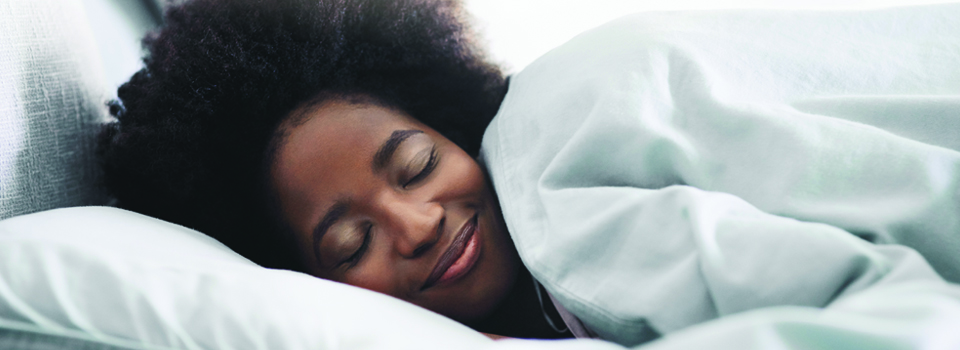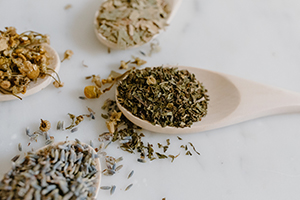There’s no way around it; sleep deprivation can be overwhelming. It makes it harder to do anything, negatively affects your mood, and even can increase your cravings for sugar. But even further, sleep deprivation is associated with weight gain, immune system dysregulation, and increased risk for other health concerns.
Sleep issues can mean you have a hard time falling asleep, staying asleep, or just don’t feel rested when you wake up, even if you’ve slept through the night.
Natural solutions for sleep are attractive because they can support the body’s natural sleep rhythms without unwanted side effects. Here are lifestyle facts you can try to help you get a better night’s rest.

Diet
A nutrient-dense, well-balanced diet is vital for all aspects of health, including sleep. Certain foods and diet patterns can impact how well you sleep.
For example, eating too late at night before bed can make it more challenging to fall and stay asleep. Your body can’t go into a state of relaxation and repair because it’s too busy working on digesting your food.
Multiple studies also suggest an association between those who eat high fat or high glycemic carbohydrate diets with low vegetable intake and poor sleep quality. Sleep and food metabolism are also closely linked as sleep deprivation is associated with increases in hormones that make you feel more hungry or even regulate blood sugar. So you wake up feeling tired, which makes you hungrier and more likely to reach for unhealthy foods, creating a vicious cycle.
Instead, nutrient-rich diet patterns like the Mediterranean diet are associated with sleep improvements. The Mediterranean diet focuses on fiber-rich foods like whole grains, fruits, and vegetables. It also emphasizes healthy fats from olive oil and avocados and minimizes processed foods.
Additionally, foods high in tryptophan like turkey, milk, or oats may help with sleep as tryptophan is a precursor for 5-HTP (5-Hydroxytryptophan). 5-HTP is a compound produced in the body from the amino acid tryptophan that then gets turned into to serotonin. Serotonin is a calming neurotransmitter that promotes relaxation, and tryptophan helps make it.
Similarly, tart cherry, a precursor for the body’s natural melatonin production, may also help with sleep. Melatonin is a hormone made by the pineal gland in your brain that helps regulate natural circadian rythmns in the body. It rises at the end of the day when it’s stimulated by waning light to help prepare you for sleep.
Healthy movement
Moving your body, especially earlier in the day, can support better sleep. Not only does it help calm your mood or feelings of stress, but it can also just make you feel more tired at the end of the day.
Exercise is linked to deeper sleep, as well as improving the quality of your sleep cycle. Interestingly, a meta-analysis that examined the impact of physical activity on sleep found that exercise supports total sleep time, how long it takes to fall asleep, and quality of sleep.
One study on healthy adults with difficulty sleeping found that a sixteen-week program that promoted aerobic exercise and sleep hygiene education (how to design your sleep environment to encourage sleep) helped with sleep quality, mood, and overall quality of life.
The timing of when you exercise is something else to consider. Some people can’t exercise later in the day because it makes them feel too energized at night. Listening to your body and individualized response can help you choose what’s best for you.

Supplements
In addition to lifestyle changes, there are also supplements to further support rest and relaxation:
Passionflower
Passionflower is a vine used in traditional medicine for its calming effects on the body. Passionflower is said to have soothing effects that promote a sense of relaxation.
Ever lie awake in bed, unable to quiet the thoughts running through your head? Passionflower could help. It may help reduce feelings of stress or occasional worry that can interrupt your sleep. Some studies suggest that passionflower tea supported a restful night’s sleep in healthy adults with occasional sleep problems more than placebo.
Valerian
Valerian root is another botanical used for many years in traditional medicine and by herbalists to promote sleep and relaxation. Current studies also point towards its effectiveness for sleep quality, as noted by a systematic review of sixteen different studies.
It could help with sleep quality and quantity because of its interactions with gamma-aminobutyric acid (GABA) to help relax your nervous system. GABA is a neurotransmitter that helps calm down the nervous system.
Lemon balm
Another gentle botanical, lemon balm, is often used to support occasional feelings of anxiety and stress that could interrupt sleep. It’s an herb named after its unique lemon scent and can be taken as a tea or a tincture. One study found that drinking a lemon-balm-infused drink or yogurt supported improvements in stress and mood.
Lemon balm is often used in combo with other botanicals to help sleep, which can improve effectiveness. A study that combined valerian and lemon balm found that the supplements helped improve feelings of restlnessness to support better sleep when combined. This herb may have the same GABA modulating benefits as seen with valerian.
Chamomile
Of all the herbs, you may be the most familiar with chamomile, especially chamomile tea, for relaxation and sleep support. Chamomile is a soothing botanical that supports a sense of calm. You’ll often find chamomile as a part of a sleep-supporting supplement with other calming herbs.
Chamomile may help you sleep by binding to receptors that stimulate calm feelings in your brain. A systematic review of studies using chamomile for mood support and sleep quality found that it significantly supported improvements in sleep quality and feelings of worry.

Supporting Sleep With A Healthy Lifestyle
Getting a good night’s sleep is critical for your health and well-being. Many people struggle with sleep, but there are many ways to try to get better rest.
You can start by looking at your diet and eating patterns. Make sure you are also moving your body daily. Additionally, you may want to consider natural botanicals like chamomile, lemon balm, valerian, and passionflower for extra support. Altogether these options can be a holistic way to improve your sleep.
- Liu, Yong, Anne G. Wheaton, Daniel P. Chapman, and Janet B. Croft. “Sleep Duration and Chronic Diseases among US Adults Age 45 Years and Older: Evidence From the 2010 Behavioral Risk Factor Surveillance System.” Sleep 36, no. 10 (October 1, 2013): 1421–27. https://doi.org/10.5665/sleep.3028.
- Medic, Goran, Micheline Wille, and Michiel EH Hemels. “Short- and Long-Term Health Consequences of Sleep Disruption.” Nature and Science of Sleep 9 (May 19, 2017): 151–61. https://doi.org/10.2147/NSS.S134864.
- Grandner, Michael A., Nicholas Jackson, Jason R. Gerstner, and Kristen L. Knutson. “Dietary Nutrients Associated with Short and Long Sleep Duration. Data from a Nationally Representative Sample.” Appetite 64 (May 2013): 71–80. https://doi.org/10.1016/j.appet.2013.01.004.
- Copinschi, Georges, Rachel Leproult, and Karine Spiegel. “The Important Role of Sleep in Metabolism.” Frontiers of Hormone Research 42 (2014): 59–72. https://doi.org/10.1159/000358858.
- Zuraikat, Faris M., Nour Makarem, Marie-Pierre St-Onge, Huaqing Xi, Alekha Akkapeddi, and Brooke Aggarwal. “A Mediterranean Dietary Pattern Predicts Better Sleep Quality in US Women from the American Heart Association Go Red for Women Strategically Focused Research Network.” Nutrients 12, no. 9 (September 16, 2020): 2830. https://doi.org/10.3390/nu12092830.
- Peuhkuri, Katri, Nora Sihvola, and Riitta Korpela. “Diet Promotes Sleep Duration and Quality.” Nutrition Research (New York, N.Y.) 32, no. 5 (May 2012): 309–19. https://doi.org/10.1016/j.nutres.2012.03.009.
- Howatson, Glyn, Phillip G. Bell, Jamie Tallent, Benita Middleton, Malachy P. McHugh, and Jason Ellis. “Effect of Tart Cherry Juice (Prunus Cerasus) on Melatonin Levels and Enhanced Sleep Quality.” European Journal of Nutrition 51, no. 8 (December 2012): 909–16. https://doi.org/10.1007/s00394-011-0263-7.
- Kredlow, M. Alexandra, Michelle C. Capozzoli, Bridget A. Hearon, Amanda W. Calkins, and Michael W. Otto. “The Effects of Physical Activity on Sleep: A Meta-Analytic Review.” Journal of Behavioral Medicine 38, no. 3 (June 1, 2015): 427–49. https://doi.org/10.1007/s10865-015-9617-6.
- Reid, Kathryn J., Kelly Glazer Baron, Brandon Lu, Erik Naylor, Lisa Wolfe, and Phyllis C. Zee. “Aerobic Exercise Improves Self-Reported Sleep and Quality of Life in Older Adults with Insomnia.” Sleep Medicine 11, no. 9 (October 2010): 934–40. https://doi.org/10.1016/j.sleep.2010.04.014.
- Eckerberg B, Lowden A, Nagai R, Akerstedt T. Melatonin treatment effects on adolescent students’ sleep timing and sleepiness in a placebo-controlled crossover study. Chronobiol Int. 2012 Nov;29(9):1239-48. doi: 10.3109/07420528.2012.719962. Epub 2012 Sep 24. PMID: 23005039.
- Miroddi, M., G. Calapai, M. Navarra, P. L. Minciullo, and S. Gangemi. “Passiflora Incarnata L.: Ethnopharmacology, Clinical Application, Safety and Evaluation of Clinical Trials.” Journal of Ethnopharmacology 150, no. 3 (December 12, 2013): 791–804. https://doi.org/10.1016/j.jep.2013.09.047.
- Janda, Katarzyna, Karolina Wojtkowska, Karolina Jakubczyk, Justyna Antoniewicz, and Karolina Skonieczna-Żydecka. Nutrients 12, no. 12 (December 19, 2020): E3894. https://doi.org/10.3390/nu12123894.
- Ngan, A., and R. Conduit. “A Double-Blind, Placebo-Controlled Investigation of the Effects of Passiflora Incarnata (Passionflower) Herbal Tea on Subjective Sleep Quality.” Phytotherapy Research: PTR 25, no. 8 (August 2011): 1153–59. https://doi.org/10.1002/ptr.3400.
- Bent, Stephen, Amy Padula, Dan Moore, Michael Patterson, and Wolf Mehling. “Valerian for Sleep: A Systematic Review and Meta-Analysis.” The American Journal of Medicine 119, no. 12 (December 2006): 1005–12. https://doi.org/10.1016/j.amjmed.2006.02.026.
- Shinjyo, Noriko, Guy Waddell, and Julia Green. “Valerian Root in Treating Sleep Problems and Associated Disorders-A Systematic Review and Meta-Analysis.” Journal of Evidence-Based Integrative Medicine 25 (December 2020): 2515690X20967323. https://doi.org/10.1177/2515690X20967323.
- Kennedy, David O., Wendy Little, and Andrew B. Scholey. “Attenuation of Laboratory-Induced Stress in Humans after Acute Administration of Melissa Officinalis (Lemon Balm).” Psychosomatic Medicine 66, no. 4 (August 2004): 607–13. https://doi.org/10.1097/01.psy.0000132877.72833.71.
- Scholey, Andrew, Amy Gibbs, Chris Neale, Naomi Perry, Anastasia Ossoukhova, Vanessa Bilog, Marni Kras, Claudia Scholz, Mathias Sass, and Sybille Buchwald-Werner. “Anti-Stress Effects of Lemon Balm-Containing Foods.” Nutrients 6, no. 11 (November 2014): 4805–21. https://doi.org/10.3390/nu6114805.
- Müller, S. F., and S. Klement. Phytomedicine: International Journal of Phytotherapy and Phytopharmacology 13, no. 6 (June 2006): 383–87. https://doi.org/10.1016/j.phymed.2006.01.013.
- Savage, Karen, Joseph Firth, Con Stough, and Jerome Sarris. Phytotherapy Research: PTR 32, no. 1 (January 2018): 3–18. https://doi.org/10.1002/ptr.5940.
- Srivastava, Janmejai K., Eswar Shankar, and Sanjay Gupta. “Chamomile: A Herbal Medicine of the Past with Bright Future.” Molecular Medicine Reports 3, no. 6 (November 1, 2010): 895–901. https://doi.org/10.3892/mmr.2010.377.
- Hieu, Truong Hong, Mahmoud Dibas, Kadek Agus Surya Dila, Nourin Ali Sherif, Muhammad Usman Hashmi, Mostafa Mahmoud, Nguyen Thi Thuy Trang, et al. Phytotherapy Research: PTR 33, no. 6 (June 2019): 1604–15. https://doi.org/10.1002/ptr.6349.
Share:
Related Posts

Benefits of Creatine in Perimenopause and Menopause
Written by Maura MacDonald, MS, RD, CSSD | 2025 As we age, the notion is that we will inevitably become weaker. Not as mobile as

Goodbye Pie Chart, Hello Phase 1 Sliders
Written by Allison Smith, ND | 2025 As we usher in a new era of DUTCH testing which leaves behind the concept of the three-way

Introducing the DUTCH Dozen
Written by Kelly Ruef, ND | 2025 Hormone testing can be complex, which is why Precision Analytical developed the DUTCH Dozen, an interpretive framework that

DUTCH Report Enhancements
Written by Hilary Miller, ND | 2025 Precision Analytical have released the newest version of the DUTCH Test. This is the report’s most significant update

Gallbladder Health 101: What It Does and How to Keep It Working Well
Written by Ashley Palmer & Pooja Mahtani | 2025 The gallbladder may not get much attention compared to the gut, but it plays a central

